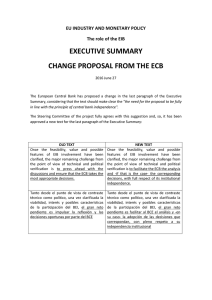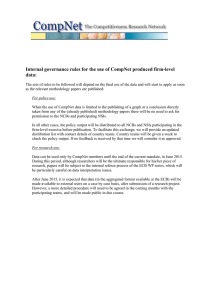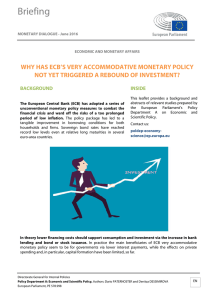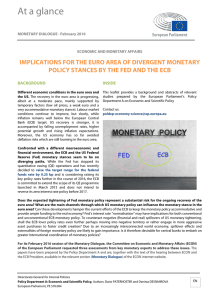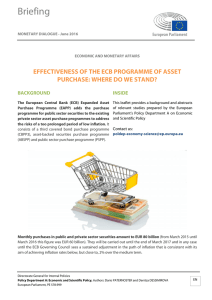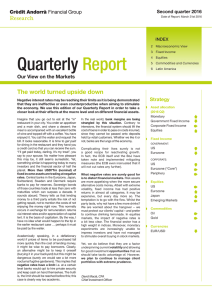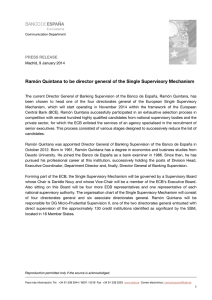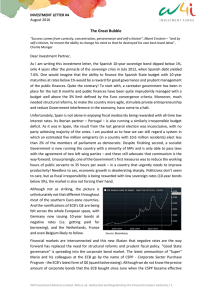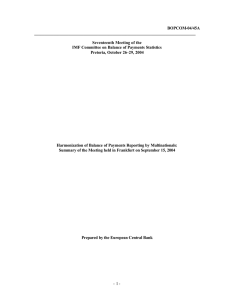The role of the European Central Bank in the design and
Anuncio
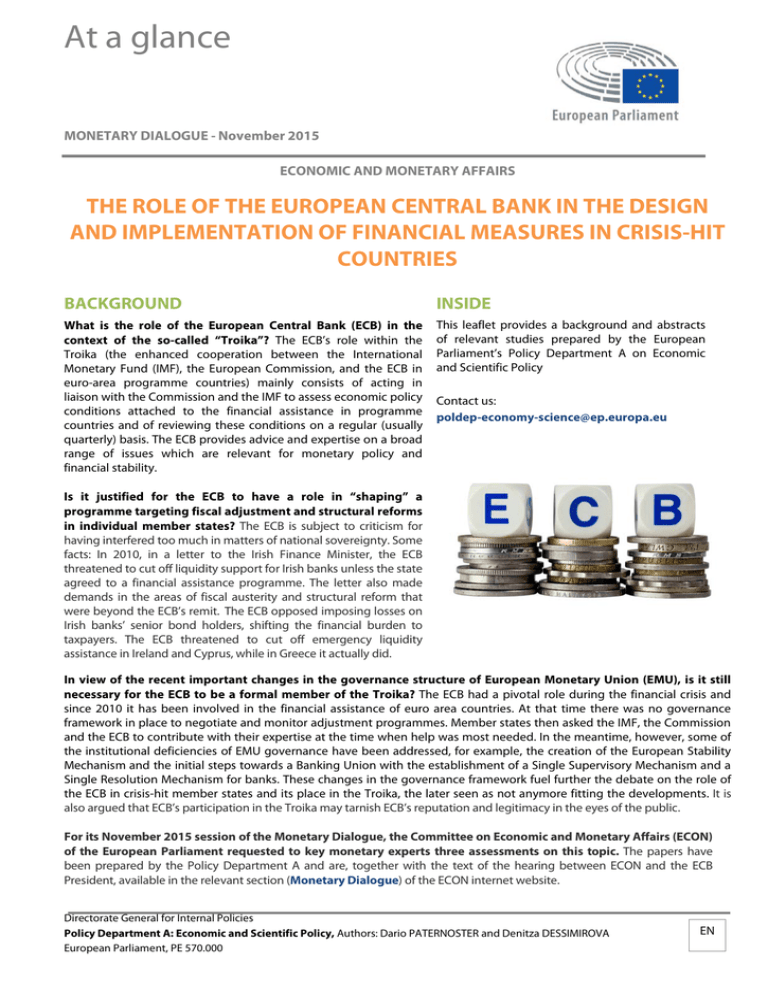
At a glance MONETARY DIALOGUE - November 2015 ECONOMIC AND MONETARY AFFAIRS THE ROLE OF THE EUROPEAN CENTRAL BANK IN THE DESIGN AND IMPLEMENTATION OF FINANCIAL MEASURES IN CRISIS-HIT COUNTRIES BACKGROUND INSIDE What is the role of the European Central Bank (ECB) in the context of the so-called “Troika”? The ECB’s role within the Troika (the enhanced cooperation between the International Monetary Fund (IMF), the European Commission, and the ECB in euro-area programme countries) mainly consists of acting in liaison with the Commission and the IMF to assess economic policy conditions attached to the financial assistance in programme countries and of reviewing these conditions on a regular (usually quarterly) basis. The ECB provides advice and expertise on a broad range of issues which are relevant for monetary policy and financial stability. This leaflet provides a background and abstracts of relevant studies prepared by the European Parliament’s Policy Department A on Economic and Scientific Policy Contact us: [email protected] Is it justified for the ECB to have a role in “shaping” a programme targeting fiscal adjustment and structural reforms in individual member states? The ECB is subject to criticism for having interfered too much in matters of national sovereignty. Some facts: In 2010, in a letter to the Irish Finance Minister, the ECB threatened to cut off liquidity support for Irish banks unless the state agreed to a financial assistance programme. The letter also made demands in the areas of fiscal austerity and structural reform that were beyond the ECB’s remit. The ECB opposed imposing losses on Irish banks’ senior bond holders, shifting the financial burden to taxpayers. The ECB threatened to cut off emergency liquidity assistance in Ireland and Cyprus, while in Greece it actually did. In view of the recent important changes in the governance structure of European Monetary Union (EMU), is it still necessary for the ECB to be a formal member of the Troika? The ECB had a pivotal role during the financial crisis and since 2010 it has been involved in the financial assistance of euro area countries. At that time there was no governance framework in place to negotiate and monitor adjustment programmes. Member states then asked the IMF, the Commission and the ECB to contribute with their expertise at the time when help was most needed. In the meantime, however, some of the institutional deficiencies of EMU governance have been addressed, for example, the creation of the European Stability Mechanism and the initial steps towards a Banking Union with the establishment of a Single Supervisory Mechanism and a Single Resolution Mechanism for banks. These changes in the governance framework fuel further the debate on the role of the ECB in crisis-hit member states and its place in the Troika, the later seen as not anymore fitting the developments. It is also argued that ECB’s participation in the Troika may tarnish ECB’s reputation and legitimacy in the eyes of the public. For its November 2015 session of the Monetary Dialogue, the Committee on Economic and Monetary Affairs (ECON) of the European Parliament requested to key monetary experts three assessments on this topic. The papers have been prepared by the Policy Department A and are, together with the text of the hearing between ECON and the ECB President, available in the relevant section (Monetary Dialogue) of the ECON internet website. Directorate General for Internal Policies Policy Department A: Economic and Scientific Policy, Authors: Dario PATERNOSTER and Denitza DESSIMIROVA European Parliament, PE 570.000 EN Policy Department A: Economy and Scientific Policy PUBLICATIONS In-Depth Analysis on 'Countries under Adjustment Programmes: What role for the ECB?' by Daniel Gros (Centre for European Policy Studies) Providing technical assistance and advice on programmes for countries under financial stress is within the mandate of the ECB. The ECB has a different role as part of the Troika. Formally the ECB does not participate in the decision making on programmes. These decisions are taken by the Finance Ministers and the International Monetary Fund. The ECB is rather part of the decision shaping process. These different roles have often been confused. The ECB should define its formal role in future European Stability Mechanism programmes as narrowly as possible. It should continue providing advice but avoid taking part in the operational work of programme surveillance. The ECB should de facto leave the Troika. An additional issue for the ECB is internal coherence: Its six-member Executive Board manages the participation in the Troika, monetary policy is decided by the Governing Council and banking supervision is under the Supervisory Board. In-Depth Analysis on 'The ECB and Financial Assistance Programmes: Has ECB Acted Beyond its Mandate?' by Karl Whelan (University College Dublin) This paper discusses the ECB’s role in Ireland’s EU-IMF programme and briefly raises some issues regarding its decisions relating to the Greek banks during 2015 year’s crisis. The absence of clear procedures for lender of last resort led to a number of key decisions being taken by the ECB in a way that fell short of the relatively transparent and accountable standards that it has set in the monetary policy area. The author recommends that the ECB should no longer be involved in designing or monitoring fiscal policy or structural reform conditionality for financial assistance programmes. Some institutional changes have occurred that make some of the negative aspects of the ECB’s involvement in Ireland’s programme less likely to occur again. However, year 2015 events in Greece show that as long as the ECB’s lender of last resort role remains confused, questions about whether the ECB is acting beyond its legal mandate and becoming overly involved in political developments will continue to be aired. In-Depth Analysis on 'The ECB’s Role in the Design and Implementation of Crisis Country Programs: Ireland and Beyond' by Ajai Chopra (Peterson Institute for International Economics) The ECB has been an integral participant in the design and monitoring of financial assistance programs for euro area countries. This paper focuses on the role the ECB played in the Ireland program and points to several missteps made by the ECB, including preventing burden sharing with senior bank creditors, pressing for swift deleveraging to reduce its exposure, and failing to provide ex ante commitments to provide liquidity support under the program. These missteps have tainted the ECB’s legitimacy in Ireland. Similarly, the ECB’s recent decision to freeze emergency liquidity assistance (ELA) for Greece has strong political associations, undermining its independence. The paper recommends that the ECB should not be a part of the Troika, negotiating and monitoring programs. Furthermore, ELA should no longer be provided by national central banks and instead should be in the hands of the ECB under transparent procedures and proper accountability. POLICY DEPARTMENTS MONTHLY HIGHLIGHTS The five policy departments are responsible for providing - both in-house and external - high-level independent expertise, analysis and policy advice at the request of committees and other parliamentary bodies. They are closely involved in the work of committees which they support in shaping legislation on and exercising democratic scrutiny over EU policies. Policy departments deliver policy analysis in a wide variety of formats, ranging from studies and in-depth analyses to briefings and the Fact Sheets on the EU. This written output serves a variety of purposes by feeding directly into the legislative work of a specific committee or serving as a briefing for delegations of members. The Monthly highlights provide an overview, at a glance, of the on-going work of the policy departments, including a selection of the latest and forthcoming publications, and a list of future events. To receive this publication send an email to: [email protected] CONTACTS Policy Department A: Economic and Scientific Policy ECON - ENVI - EMPL - IMCO - ITRE - TAXE [email protected] SUPPORTING ANALYSES Access all Studies, In-depth analyses, Briefings and At a glance notes produced by the Policy Departments. All publications: www.europarl.europa.eu/supporting-analyses Disclaimer The content of this document is the sole responsibility of the author and any opinions expressed therein do not necessarily represent the official position of the European Parliament. It is addressed to the Members and staff of the EP for their parliamentary work. Reproduction and translation for non-commercial purposes are authorised, provided the source is acknowledged and the European Parliament is given prior notice and sent a copy. February 2016
